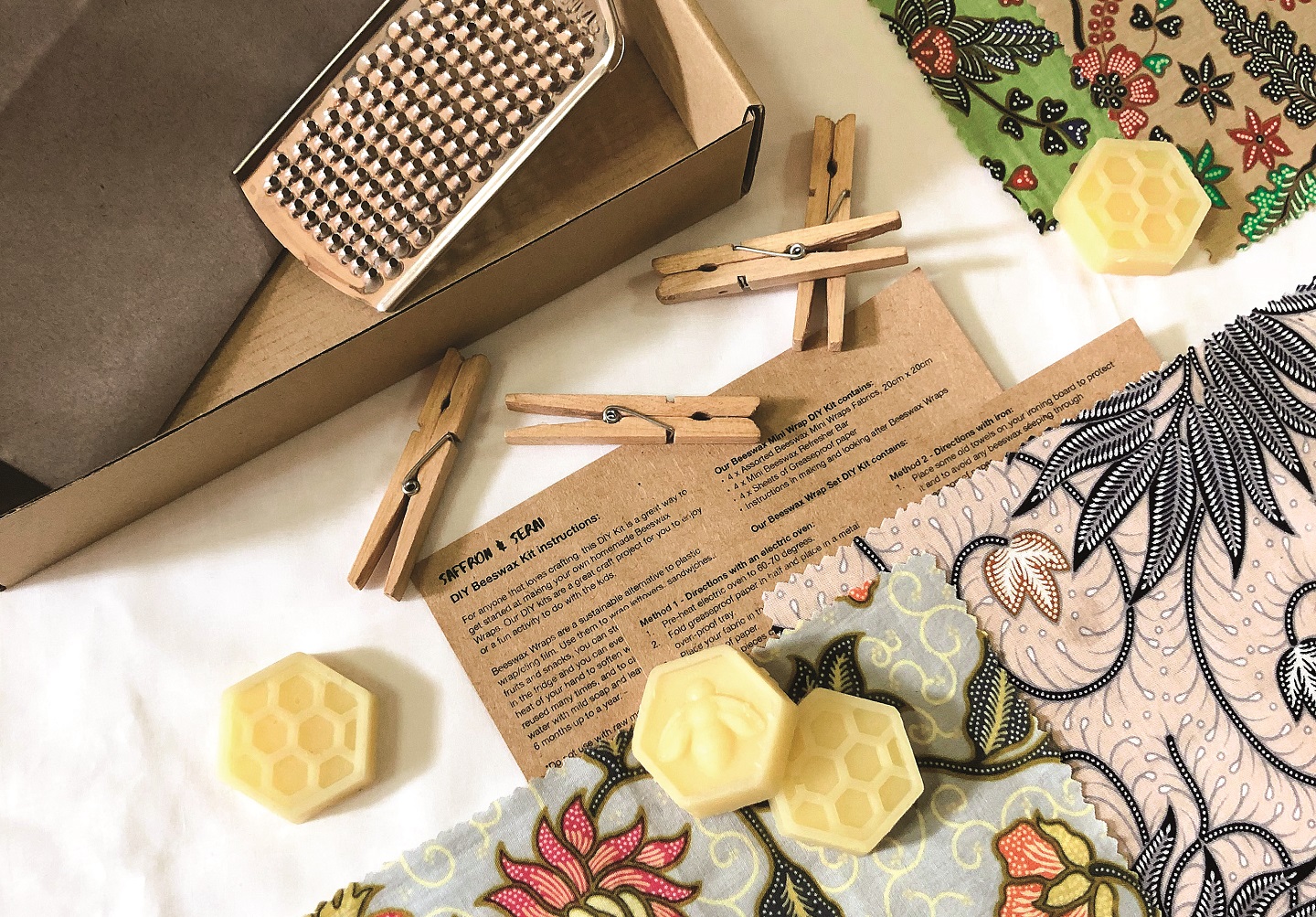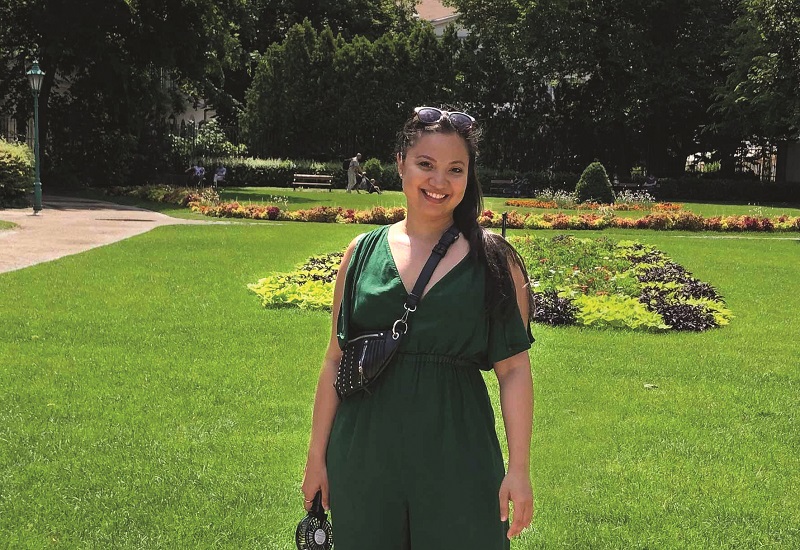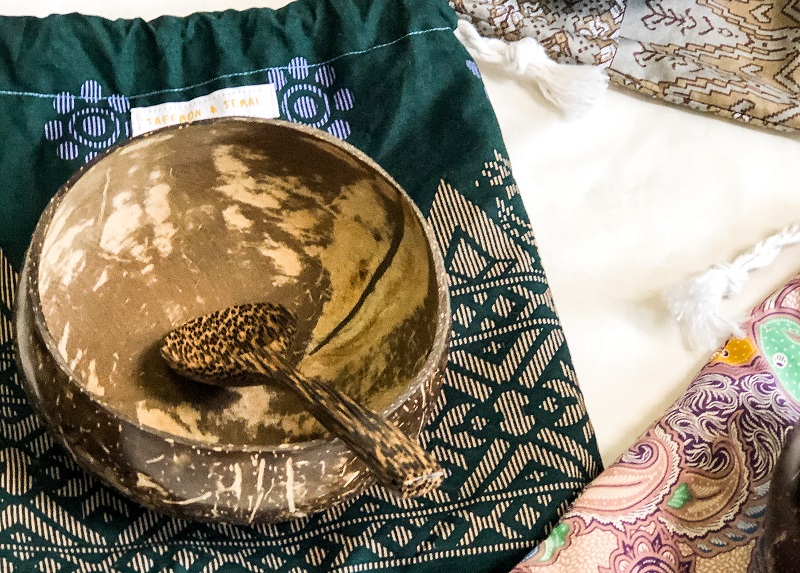
Founder Iman named her business Saffron & Serai and decided that sustainability would be at its core (All photos: Saffron & Serai)
Iman Preece had always wanted to start her own business and make something that was all her own. It was while working in the UK that the pandemic hit, and during the ensuing lockdowns that she realised her moment had come. “You know how people always say, ‘Oh, I don’t have time’. I realised I no longer had that excuse. I was working in an interior design company and we had a lot of leftover fabrics that would just be thrown out. I kept everything, basically wanting to upcycle them into cushions and things like that. So I ordered a sewing machine online and started learning how to sew from YouTube,” she says.
Iman named her business Saffron & Serai and decided that sustainability would be at its core. “My mum is Malaysian and my father is English. So, I knew I wanted a Malaysian twist or Malaysian aesthetic,” she says. As the pandemic raged on, she decided to move back to Malaysia last July and brought her business ideas with her. As she no longer had access to leftover fabrics from her previous company, she began working with leftover batik to make masks.
It was when a friend suggested making beeswax wraps, to replace clingfilm for wrapping food, that the main product of her business emerged. “My aunt used to have beeswax wraps lying around the house and I remember feeling them. They were all plain, so they never really appealed to me because they were just simple, plain cotton or canvas and I thought, ‘It’s nice but too utilitarian and super basic’,” she explains.
founder_of_saffron_serai-iman_.jpg

As a result, Saffron & Serai’s beeswax wraps come in a range of patterns and designs, including Malaysian batik. But the R&D behind its creation was not easy. “For beeswax wraps, you can only use 100% cotton. So, it was initially me trying to use batik remnants and also trying to find a recipe that works because I think online, people share information but they keep some to themselves. So, I was basically tweaking the recipe to the point that I thought, this actually works,” says Iman.
Her mother runs a food and beverage (F&B) business, so naturally, she became Iman’s first guinea pig. “I said, ‘How about you use this at home and then you won’t need to use cling film’. My mum started using it to wrap her bread dough, to let the bread proof and rise. She found that the beeswax wraps were perfect for this as they would let the bread breathe but not sweat. She started to replace all the cling film that she used at home,” Iman says cheerfully.
During the testing phase, Iman learnt a lot. “I think one of the most important things I’ve learnt is to understand quantities. For example, how much fabric would create this many wraps and for that, how much beeswax, jojoba oil and pine resin I would need,” she adds. This was especially important as the demand for her product began to rise.
In May 2020, Iman launched her website and she admits that the business side of things was a bit of an uphill battle. “I don’t come from a business or technical background, so the first phase of even trying to figure out how to build a website was challenging. Anybody can create something on Instagram, but personally, I feel like you need another layer. So, the first step was creating a Shopify website, and that took me a long time to get my head around because I’m, I would say, more of a creative person,” she says.
Thankfully, her friend runs a bricks-and-mortar store called Shop Unplug, a sustainable-living store in Bangsar, so Saffron & Serai’s beeswax wraps were first made available there. “I noticed it moved slowly, but my friend would guide me. She would say, ‘I’ve noticed that people are not so keen on this pattern’, or ‘Perhaps you could pick more colours like this’. It was useful having someone on the ground giving you feedback, so I could learn what people actually wanted,” says Iman.
coconut-bowl-03.jpg

Saffron & Serai’s beeswax wraps come in a variety of colours, patterns and sizes. It even has beeswax canvas bags, which are ideal for packing food to go. A trip to Terengganu to meet with artisans and batik makers sparked the idea for another product. “It was around November or December that I travelled to meet batik suppliers, and my mother and brother came with me. To pray, they would stop at the surau. But in the surau, you had to bring your own prayer mat because you couldn’t share and you basically were not allowed to touch anything. And my brother didn’t bring his own, so he was praying on the floor and that really bothered me,” Iman explains. She began making foldable batik prayer mats in two sizes out of bamboo fibre, which has antibacterial properties.
During her trip to Terengganu, Iman also sourced for other sustainable products that she could sell on her website, such as woven floor mats and place mats as well as coconut bowls and cutlery. “I was trying to find artisans who could make things that I could have customised for the look and feel that I like. I began selling items like the coconut bowls when customers came asking for them,” she says.
At the heart of Saffron & Serai is Iman’s aim to make being kinder to the environment and moving towards sustainable, zero-waste practices a more seamless transition. “The idea of my brand is to make being sustainable normal. It’s a lifestyle, little things you can incorporate into your everyday life.”
It was at the start of this year’s Movement Control Order that Iman felt stagnant as fabric warehouses were shut, so her production and new designs were halted. To make full use of the time, she updated her website and began selling beeswax refresher bars. “Beeswax wraps will last you about six months to one year. After realising that the product does move, I started thinking about the end of its lifetime. Do people just throw it away? Yes, it’s compostable and biodegradable, you can put it in your compost heap and it’ll break down because it’s all natural. But what if I could extend its life?” Iman adds that with the help of the beeswax refresher bars, the wraps can last four to six years.
Saffron & Serai has begun selling its wraps wholesale, which means massive production numbers. So far, it has created personalised wraps for corporate company gifts and even had a range produced in collaboration with The Coffee Bean & Tea Leaf.
Iman has big dreams for Saffron & Serai. “I would love to see our beeswax wraps becoming the norm, replacing cling film and plastic in F&B settings such as cafés, starting in KL and then the rest of Malaysia. I want beeswax wraps to be easily available to customers — displayed among coffee beans and drinkware and offered as an alternative to plastic when taking away. In addition to this, it would be amazing to be able to have our beeswax wraps in larger grocery stores such as Ben’s Independent Grocer, Village Grocer and Jaya Grocer,” she says.
This article first appeared on Sept 27, 2021 in The Edge Malaysia.


